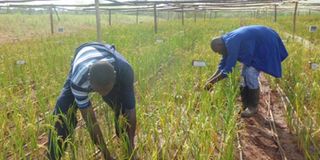Naro launches report on GM crops, Ugandans urged on science

A field trial at a research institute. While countries that adopted biotech/GM crops are reaping economic benefit, Uganda is losing because of a lack of legal framework. PHOTO BY LOMINDA AFEDRARU
Commercialisation of biotech crops marked 20 years in 2015 with the various crops hitting a coverage of two billion hectares globally.
Every year, a report is compiled by International Service for the Acquisition of Agri-biotech Applications (ISAAA), which is circulated to countries either engaged or have an interest in agricultural biotechnology.
In Uganda, the National Agricultural Research Organisation (Naro), under which biotechnology research is carried out, launched the report in Kampala on 29 June.
Embrace science
At the event, the state minister for agriculture Christopher Kibazanga expressed the need to embrace science and technology for national development.
“Majority of the population depends on agriculture and there is need to create employment for the citizens. This can be done by embracing new technologies where commerciliased agriculture is practised,” he said.
“If we can produce enough food using science and technology we shall eradicate the challenge of hunger in the country.”
Rose Mutonyi Masaba, MP for Bubulo West, noted that her Manafwa district is faced with land shortage since the area is mountainous meaning there is need to practise agriculture with varieties bred via biotechnology.
“I am perturbed by people who are resist science and technology. When coffee was introduced, farmers rejected it saying it will damage the soil. But when the white men forced them to grow it, they were happy because they benefited financially,” she pointed out.
“So what is wrong if farmers grew GM crops alongside the traditional crops? Will they not benefit financially,”
She added that in her constituency, farmers go for hybrid maize compared to traditional varieties because they know the economic benefit.
No legal framework
Gilbert Gumisiriza, a research analyst at Naro’s Uganda Biosciences Information Centre (UBIC), explained the global picture of commercialisation of biotech crops.
He observed that Uganda loses out on the economic benefit totaling to more than $150b, which is earned by countries that have adopted and commercialised them in 2015.
This is because biotech crops, which have been developed for resistance to pests and diseases as well as challenges such as drought, cannot be commercialised in Uganda because there is no legal framework in place.




